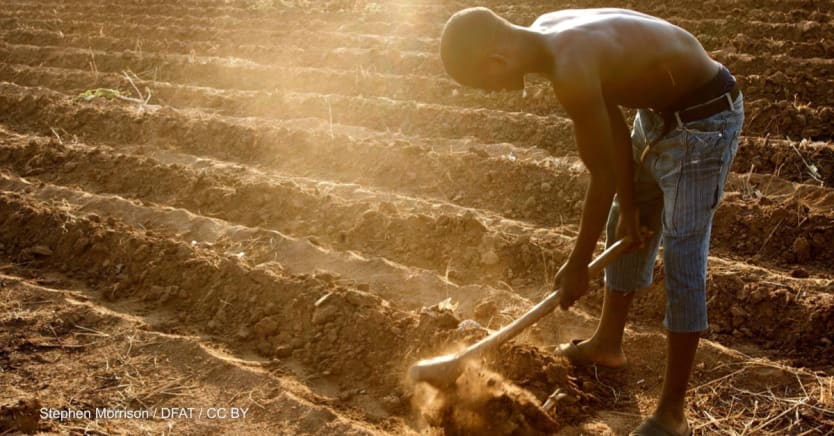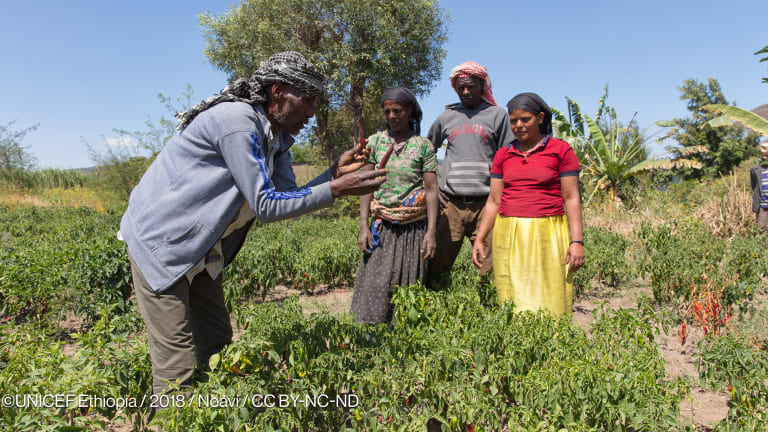Faith groups lead call to defund industrial agriculture in Africa

An alliance of faith-based and civil society groups working for food sovereignty and sustainability in Africa called on donors to stop funding the Alliance for a Green Revolution in Africa and other programs that promote industrialized agriculture on the continent.
Part of our Focus on: Faith and Development
This series illuminates the role faith actors and their communities play in strengthening global development outcomes.
The Alliance for Food Sovereignty in Africa is the continent’s largest network of faith-based organizations and other civil society groups, representing more than 200 million farmers, fishers, pastoralists, and Indigenous peoples across Africa.
This week, AFSA delivered a letter — endorsed by international organizations — to AGRA donors, saying “AGRA has unequivocally failed in its mission to increase productivity and incomes and reduce food insecurity,” and stated in a press release that AGRA “does not speak for African small-scale farmers.”
It said AGRA, which was created with the goal of transforming smallholder agricultural ventures into farming businesses, should be defunded and said donors should instead “support African-led efforts to expand agroecology and other low-input farming systems.”
“After nearly 15 years and spending of more than US$1 billion to promote the use of commercial seeds, chemical fertilizers, and pesticides in 13 African countries, and additional US$1 billion per year of African government subsidies for seeds and fertilizers, AGRA has failed to provide evidence that yields, incomes or food security increased significantly, and sustainably, for smallholder households across its target countries,” the letter stated.
“Fifteen years and billions of dollars later, donors really need to recognize that the green revolution approach has failed.”
— Timothy Wise, senior adviser, Institute for Agriculture and Trade PolicyAFSA also criticized AGRA for promoting monoculture farming — growing only one crop at each time on a specific field — as that forces farmers to rely on chemicals that harm the environment while making the farmers themselves dependent on corporations and long supply chains. ASFA said the organization’s strategy “undermines resilience, and increases the risks of debt for small-scale farmers in the face of climate change.”
AGRA was founded in 2006 with the vision of using a “green revolution” — a push to transform agriculture and raise yields through what it calls “innovative approaches” — to increase the income and food security of 30 million small-scale farmer households by 2021. To achieve these goals, AGRA received funding from the Bill & Melinda Gates Foundation, as well as other donors including the United States, United Kingdom, and Germany.
AGRA President Agnes Kalibata said the organization had exceeded many of its targets, writing in the organization’s 2020 annual report that it directly reached 3.9 million smallholder farmers over the course of the year. In addition, she wrote, “We now have 2.6 million farmers selling surplus produce through structured off-taker trading arrangements, generating over USD1 billion in smallholder revenue.”
But a group of researchers found that during AGRA’s years of operation, yields for key staple crops remained just as low as they were in the years before the alliance was created. They wrote that “instead of halving hunger, the situation in 13 focus countries has worsened since AGRA was launched. The number of people going hungry has increased by 30 percent during the AGRA years.”
Timothy Wise, senior adviser at the Institute for Agriculture and Trade Policy and one of the researchers, said they found “that there is no sign of a productivity revolution in AGRA’s focus countries — nothing that is significantly raising incomes and reducing hunger.”
“Fifteen years and billions of dollars later, donors really need to recognize that the green revolution approach has failed,” he said at an AFSA press briefing. “Shocking, given the amount of money you poured into this campaign.”
How smallholder farmers in Africa can compete against imports
The African continent imports about $72 billion of food per year. Local farmers are at a disadvantage because their product prices are often higher than food that comes from abroad.
Faith-based organizations working in African farming communities had noticed that instead of helping farmers, AGRA initiatives were actually eroding the rights of farmers through government policies that are being pushed by the organization, according to Francesca de Gasparis, executive director at the Southern African Faith Communities Environment Institute — a member of AFSA.
SAFCEI shared an open letter to the Gates Foundation in June, requesting a change in the organization’s industrial agriculture policy in Africa, which it said was deepening the humanitarian food crisis.
“What African farmers need is support to find communal solutions that increase climate resilience, rather than top-down profit-driven industrial-scale farming systems,” she said at the AFSA briefing. “You need to start listening to the smallholder farmers of Africa, you need to start listening to those of us that are directly in connection with them.”
Fadel Ndiame, deputy president of AGRA, said the organization understands that AFSA has concerns about forms of agriculture that don't respect nature, are overly dependent on external inputs, and don't respect local knowledge — but said AGRA does not do any of these things.
He said AGRA’s work is smallholder driven, science-based, and African-led. Smallholder farmers — working with the national research systems — are provided with place-specific knowledge and information through the organization.
Village startups battling the fraudulent seed market in Kenya
In a bid to improve access to high-quality agricultural inputs, trusted village startups in Kenya have started to supply smallholder farmers with quality seeds and fertilizers.
“It is so important to use all the tools at our disposal,” he said. “We need to increase [productivity] by combining crop-based genetic gains that came from research.” He said it would not be right to deny African smallholder farmers the opportunity to access these gains, as some of the seed varieties African farmers are using, even as the climate changes, are decades old.
“We should be driven by [scientific] evidence and not spend too much time on ideological [discussions] … because the reality is much more complex. You need to combine all the options, but do it with the end in mind,” he said.
The Gates Foundation said in a statement that it shares AGRA’s view that there are many paths to sustainably increasing smallholder farmers' productivity and incomes in sub-Saharan Africa. The statement said the foundation also supports “AGRA’s efforts to monitor progress continually and collect data to inform what’s working and what’s not working.”
“We believe that African farmers should be empowered to choose from a range of innovations that can help them adapt to stressful conditions like high temperatures, droughts, floods, pests, and diseases which continue to intensify due to climate change,” it said.
But Wise insisted that, based on performance, AGRA had no right to claim that it speaks for African farmers.
“It is time for donors to listen to African farmers and community leaders,” he said.
Devex, with support from our partner GHR Foundation, is exploring the intersection between faith and development. Visit the Focus on: Faith and Development page for more. Disclaimer: The views in this article do not necessarily represent the views of GHR Foundation.

Search for articles
Most Read
- 1
- 2
- 3
- 4
- 5








